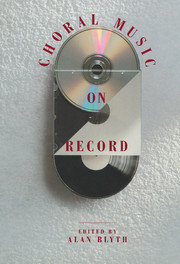Book contents
- Frontmatter
- Contents
- Preface
- Monteverdi: Vespers (1610)
- J.S. Bach: St John Passion
- J.S. Bach: St Matthew Passion
- J.S. Bach: Mass in B Minor
- Handel: Messiah
- Mozart: Requiem Mass
- Haydn: The Creation
- Haydn: The Seasons
- Beethoven: Missa Solemnis
- Mendelssohn: Elijah
- Rossini: Stabat mater Petite messe solennelle
- Berlioz: Grande Messe des Morts Te Deum L'Enfance du Christ
- Verdi: Requiem Mass
- Brahms: A German Requiem
- Fauré: Requiem
- Elgar: The Dream of Gerontius
- Walton: Belshazzar's Feast, Tippett: A Child of Our Time, Britten: War Requiem
- Stravinsky: The Wedding Symphony of Psalms
- Janáček: Glagolitic Mass
- Discographies
- Index
Handel: Messiah
Published online by Cambridge University Press: 02 December 2009
- Frontmatter
- Contents
- Preface
- Monteverdi: Vespers (1610)
- J.S. Bach: St John Passion
- J.S. Bach: St Matthew Passion
- J.S. Bach: Mass in B Minor
- Handel: Messiah
- Mozart: Requiem Mass
- Haydn: The Creation
- Haydn: The Seasons
- Beethoven: Missa Solemnis
- Mendelssohn: Elijah
- Rossini: Stabat mater Petite messe solennelle
- Berlioz: Grande Messe des Morts Te Deum L'Enfance du Christ
- Verdi: Requiem Mass
- Brahms: A German Requiem
- Fauré: Requiem
- Elgar: The Dream of Gerontius
- Walton: Belshazzar's Feast, Tippett: A Child of Our Time, Britten: War Requiem
- Stravinsky: The Wedding Symphony of Psalms
- Janáček: Glagolitic Mass
- Discographies
- Index
Summary
A keyboard virtuoso and composer of the highest calibre, George Frideric Handel was also a practical musician and entrepreneur. He owned at least an interest in the production companies that presented his operas and oratorios and he also frequently acted as an impresario, organising and promoting his own concerts. None of his compositions was graven on stone; he considered them all subject to revision, not only to improve them, but also to meet the practical requirements of particular performances. He often altered works to suit the capabilities of available performers.
In the case of Messiah, these observations are especially pertinent. Contrary to popular belief, the oratorio was not an immediate hit in England. After its initial success in Dublin, Handel took it back to London, where it met with indifference from the general public and outright hostility from those who – with the tacit support of Edmund Gibson, the then Bishop of London – considered it a sacrilege to perform a setting of biblical texts in a theatre, with popular stars as soloists.
In its first three seasons in London – 1743,1745 and 1749 – Messiah was a dismal failure. Not until 1750, a couple of years after Thomas Sherlock had succeeded Gibson as bishop, did it catch on; Handel gave two benefit performances – the second by popular demand – in the Chapel of the Foundling Hospital, an orphanage of which he was a trustee. Thereafter, for the rest of Handel's life, Messiah was a staple of his annual spring season of oratorios.
Practically every year that he presented it, Handel made changes, rewriting, transposing or replacing individual numbers.
- Type
- Chapter
- Information
- Choral Music on Record , pp. 61 - 101Publisher: Cambridge University PressPrint publication year: 1991

